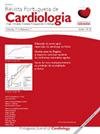The impact of the COVID-19 pandemic on arterial hypertension monitoring in Portugal
IF 1.6
4区 医学
Q3 CARDIAC & CARDIOVASCULAR SYSTEMS
引用次数: 0
Abstract
Introduction and objectives
This study aimed to evaluate the impact of the COVID-19 pandemic on healthcare provided to patients with arterial hypertension in Portugal.
Methods
The pre-pandemic and pandemic periods were compared using publicly available data on performance and health outcome indicators from the Portuguese National Health Service (NHS). Pre-pandemic data were modeled to project hypothetical scenarios without a pandemic using an exponential smoothing algorithm, and then compared with data collected during the COVID-19 pandemic. A cohort model was developed to estimate the number of all-cause deaths and years of life lost (YLL) due to the reduction in blood pressure (BP) monitoring and in BP records <150/90 mmHg during the first two years of the pandemic. Microsoft Excel® was used for statistical analyses.
Results
There was a 26.4% relative reduction in the number of patients with hypertension under 65 years of age with at least one BP measurement, and a 21.8% relative reduction in the proportion of patients with BP <150/90 mmHg during the first two years of the pandemic. The model projections were 176 additional deaths and 3287 YLL among the Portuguese population of patients with hypertension.
Conclusions
The disruption in BP testing in Portugal during the pandemic increased hypertension-associated morbidity and mortality, with significant YLL. The long-term implications of impaired monitoring of patients with hypertension should be assessed, and proactive strategies implemented to mitigate the increase in hypertension morbidity and mortality associated with the COVID-19 pandemic.
COVID-19大流行对葡萄牙动脉高血压监测的影响
前言和目的:本研究旨在评估COVID-19大流行对葡萄牙动脉高血压患者医疗保健的影响。方法:利用葡萄牙国家卫生服务(NHS)的绩效和健康结果指标的公开数据,对大流行前和大流行时期进行比较。使用指数平滑算法对大流行前的数据进行建模,以预测没有大流行的假设情景,然后与COVID-19大流行期间收集的数据进行比较。建立了一个队列模型来估计由于血压(BP)监测和血压记录的降低而导致的全因死亡和生命年损失(YLL)的数量。结果:65岁以下至少有一次血压测量的高血压患者数量相对减少26.4%,BP患者比例相对减少21.8%。大流行期间葡萄牙血压检测的中断增加了高血压相关的发病率和死亡率,并伴有显著的YLL。应评估高血压患者监测受损的长期影响,并实施积极主动的战略,以减轻与COVID-19大流行相关的高血压发病率和死亡率的上升。
本文章由计算机程序翻译,如有差异,请以英文原文为准。
求助全文
约1分钟内获得全文
求助全文
来源期刊

Revista Portuguesa De Cardiologia
CARDIAC & CARDIOVASCULAR SYSTEMS-
CiteScore
2.70
自引率
22.20%
发文量
205
审稿时长
54 days
期刊介绍:
The Portuguese Journal of Cardiology, the official journal of the Portuguese Society of Cardiology, was founded in 1982 with the aim of keeping Portuguese cardiologists informed through the publication of scientific articles on areas such as arrhythmology and electrophysiology, cardiovascular surgery, intensive care, coronary artery disease, cardiovascular imaging, hypertension, heart failure and cardiovascular prevention. The Journal is a monthly publication with high standards of quality in terms of scientific content and production. Since 1999 it has been published in English as well as Portuguese, which has widened its readership abroad. It is distributed to all members of the Portuguese Societies of Cardiology, Internal Medicine, Pneumology and Cardiothoracic Surgery, as well as to leading non-Portuguese cardiologists and to virtually all cardiology societies worldwide. It has been referred in Medline since 1987.
 求助内容:
求助内容: 应助结果提醒方式:
应助结果提醒方式:


